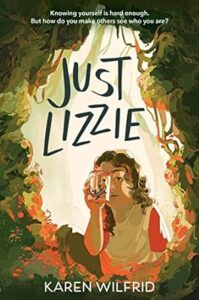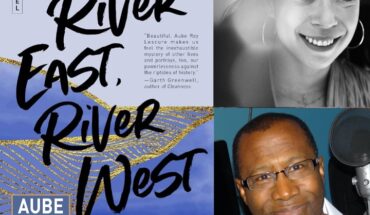 Karen Wilfrid’s middle grade debut novel Just Lizzie (November, 2023 Harper Collins), effortlessly braids a nuanced journey of identity with the bittersweet angst of growing up. Fourteen-year-old Lizzie is experiencing a lot of change: her family’s recently moved, her brother’s too busy for her in his first semester of college, and her friends are more interested in dating than dolls. It’s hard not to feel left behind, especially as she tries to explain she has zero interest in boys, or the baffling behavior known as “flirting.”
Karen Wilfrid’s middle grade debut novel Just Lizzie (November, 2023 Harper Collins), effortlessly braids a nuanced journey of identity with the bittersweet angst of growing up. Fourteen-year-old Lizzie is experiencing a lot of change: her family’s recently moved, her brother’s too busy for her in his first semester of college, and her friends are more interested in dating than dolls. It’s hard not to feel left behind, especially as she tries to explain she has zero interest in boys, or the baffling behavior known as “flirting.”
But as Lizzie’s world feels like it’s closing in, a class lesson on asexual reproduction piques her curiosity, and she finally has a word for all her messy, unnameable feelings.
My favorite moments in this novel come as Lizzie finds her voice and asserts her new-found knowledge of herself with her peers. As Publishers Weekly says, “debut author Wilfred captures the indomitable spirit of one middle schooler struggling to better understand herself and the world around her.”
What was the original spark for this story?
I had wanted to write about asexuality for a long time, but I would say that the character Lizzie was the spark for this novel, rather than the topic. She was already a minor character in a different novel that I had been querying for a long time without success, and one day I had the thought, “I think Lizzie is asexual.” The rest of her story began to flow from there, and eventually I turned my attention to writing a book about her.
You revised your entire novel during the pandemic while teaching middle school and taking Novel Incubator—no small feat. What tips do you have for writers struggling to carve out time for their project?
I wish I had an amazing answer for this question! I’m not one of those writers with a consistent routine, which I hope makes someone out there feel better. My best advice is that no amount of time is too small to be significant, and often when you think you have nothing to say, just getting started is enough to spark inspiration. This happens to me sometimes when I’m on my way to work; I have about a twenty-minute walk, and in that time, I like to daydream and think up story ideas. Sometimes I’ll then sit down when I get to work and try to jot it down, usually thinking, “I’ll just do this quickly…” The next thing I know, I’m struggling to stop myself so I’ll be ready in time for my students to arrive!
Lizzie’s a wonderful character, strong, sharp and funny. She’s also quiet and thoughtful and the question she grapples with is interior—her identity. Quiet characters with inner struggles are challenging because writers need characters acting and reacting on the page. What were your strategies to externalize Lizzie’s inner life?
This was tough and a major part of the revision process! After reading my first draft, my Novel Incubator group told me, “This is lovely…but Lizzie doesn’t really do anything.” Another writing instructor framed it this way: “You have to figure out what Lizzie is running towards and not always what she’s running from.” Focusing on concrete goals that paralleled her inner journey (like her yearlong science project, or standing up to a boy in her class) was ultimately the way I navigated this. I also had to cut some of the scenes that were mostly her thinking—even though those were some of my favorites!
Speaking of Lizzie’s inner life, for most of us it’s been a hot second since we were in middle school. How did you get inside the heart and mind of a 21st century thirteen-year-old?
I teach middle school, so that helped me to capture the dynamics and dialogue of the characters I was imagine. As for the heart and mind, I’m convinced that a part of me is still stuck in middle school, so the voice came pretty naturally (with a few places where I needed to be reminded by early readers that my teenage character’s word choice or reasoning sounded too “adult”). Above all, I wanted to write honestly and not avoid or oversimplify difficult topics. I think today’s young people can handle a lot more than we often give them credit for.
Tension! Despite having read previous drafts, I was on the edge of my seat for the outcomes of both the self-defense class and Lizzie’s project about asexuality. What was your thought process behind the changes you made to ratchet up the tension?
Surprisingly, a lot of this came down to the earlier question about externalizing Lizzie’s conflict and figuring out what her wants/motivations were. For both the self-defense class and the asexuality project, it took me many drafts to figure out what Lizzie’s hopes/goals were from the outset, and once I had those clear in my mind, it was easier to plot the developing tension and what would move her toward those goals or stand in her way.
It’s so gratifying to see Lizzie’s arc and all the small skirmishes and victories along the way. The changes in her relationships with each character all build toward the final victory. How did you keep track of those progressions so you knew each relationship arc was building and not repeating?
I’d say my approach is the inverse of the previous question: Knowing where I intended to end up helped me to progress toward there from the beginning (though along the way I definitely fell prey to scenes that repeated rather than developing!). One thing that both helps and hurts with this is the fact that I don’t write chronologically; I write scenes as they come to me. So on the one hand, I already had scenes from the end of the book with Lizzie and other minor characters and knew where they were headed—but on the other hand, the emotional/character development in these scenes sometimes felt out of sync in my early revisions.
Once your book was accepted, your editor asked you to cut 10k words. Yikes! What was your strategy for that?
Yes, the cuts were definitely tough! As I mentioned above, some of what I cut were the more introspective scenes that didn’t advance the storyline/characters, and I also found that rearranging some of my plot events made it possible to cut some “in between” scenes that turned out not to be necessary.
Finally, I’d love to hear about why your book is dedicated to Helen and Tyler?
Helen, a.k.a. “Mrs. Jones,” was my first-grade teacher, and the teacher who first encouraged me as a writer. I always loved to write stories, and Mrs. Jones let me sit in her special “teacher’s chair” at storytime and read my own stories to the class. I never forgot that feeling of having an audience, and of being treated like a “real” writer the same as the authors of published books we read together. Mrs. Jones is 90 now, and I haven’t seen her since we moved away when I was ten, but we stayed in touch and I was able to send her a signed copy of JUST LIZZIE, which was an amazing honor.
Tyler is a former student of mine, and also very special to me. He passed away in 2021, and I’ll never forget the impact he had on me as both a teacher and a writer. He was a strong reader and writer himself, and overall a beautiful kid.
As it turns out, even dedicating a book doesn’t feel like enough to honor these two amazingly influential people in my life, but it was still gratifying to be able to do.
Karen Wilfrid is a writer and seventh-grade English teacher based in Newton, Massachusetts.
After receiving her B.A. in Creative Writing and Spanish from Oberlin College, she taught for two years on a Fulbright teaching fellowship in Cantabria, Spain. She is a graduate of Grub Street’s Novel Incubator Program, and now specializes in essays, fiction, and teaching seventh graders the finer points of comma usage. Her work has appeared in Cicada magazine, Publishers Weekly, Dead Darlings, and Embark literary journal.




1 comment